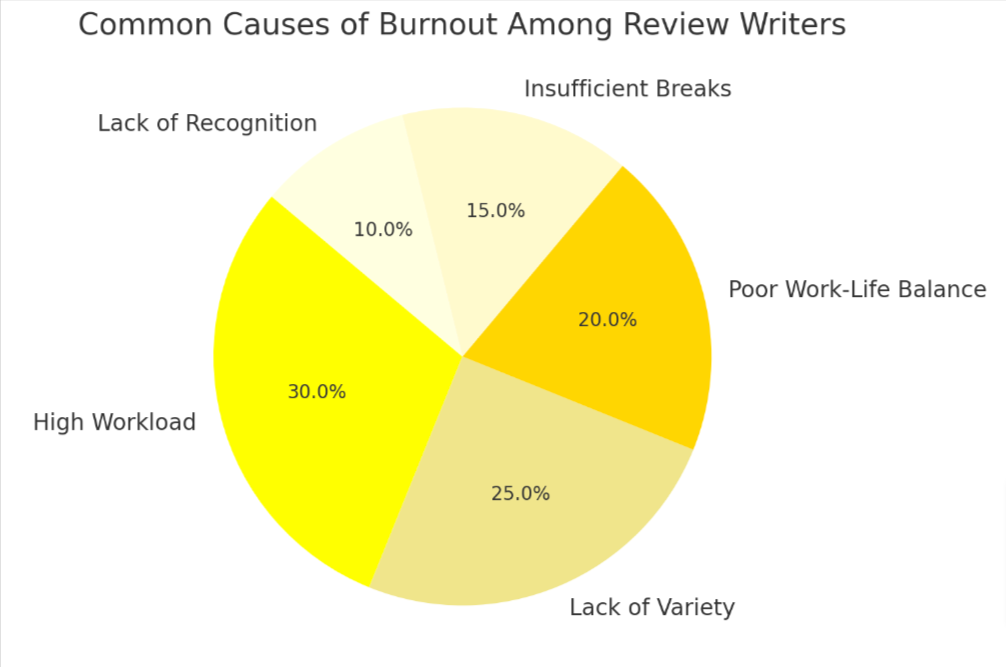Maintaining Momentum: Preventing Burnout in Review Writing
Feeling tired from writing too many reviews? Writer burnout affects thousands every year, making it hard to stay creative and productive. This blog will share easy strategies for keeping your review writing fresh and enjoyable without the crash.
Let’s keep that spark alive!
Key Takeaways
- Recognizing signs of burnout early, such as decreased motivation and persistent exhaustion, is important for maintaining a sustainable writing practice.
- Implement strategies like organizing your workspace, taking regular breaks, and balancing work with personal life to prevent writer’s burnout.
- Challenge yourself by trying new things in your writing to keep creativity flowing and avoid the monotony that can lead to burnout.
- Building a supportive network of friends, family, or colleagues can provide emotional support and help manage the stresses of review writing.
- Reframe your mindset toward challenges as opportunities for growth; this positive thinking along with establishing healthy lifestyle habits helps sustain productivity.
What is Burnout and Why It Occurs
Burnout is a state of emotional, physical, and mental exhaustion caused by prolonged stress and overwork. It can occur when writers feel overwhelmed, unappreciated, or unsupported in their work.
Understanding the causes and impact of burnout is crucial for sustainable review writing practices.
Definition of burnout
Burnout is a state of physical, emotional, and mental exhaustion caused by prolonged stress or overwork. It often happens when you feel overwhelmed and unable to meet constant demands.
As the stress continues, you begin to lose the interest and motivation that led you to take on a certain role in the first place.
Physical symptoms can include tiredness, illness, and reduced immunity—signs your body is unable to cope with pressures it’s facing. Emotionally, burnout drains your energy and makes you feel increasingly helpless, hopeless, cynical, and resentful.
Eventually, this leads to a drop in productivity and leaves you feeling less capable at work. Writers experiencing burnout might notice their creativity dwindling alongside an inability to maintain their usual writing pace or sustain productivity levels necessary for successful review writing.
Causes of burnout
Writers face burnout when they push themselves too hard for too long. It’s vital to understand the root causes to avoid hitting that wall.
- Unrelenting deadlines create a constant sense of urgency, making writers feel like they can never catch their breath. This pressure cooker environment is a fast track to exhaustion.
- Inadequate breaks and rest periods leave the mind and body drained. Without time to recharge, creativity and productivity plummet.
- High expectations, both self – imposed and from others, pile on the stress. Striving for perfection in every piece can wear a writer down mentally.
- Lack of variety in writing assignments can stifle enthusiasm and lead to disinterest. Monotonous tasks are surefire joy killers.
- Poor work – life balance happens when review writing consumes personal time, leaving little room for relaxation or leisure activities. All work and no play isn’t sustainable.
- Skimping on self-care makes writers more vulnerable to burnout. Neglecting physical health and mental well-being is a major risk factor.
- Insufficient support systems mean writers often deal with challenges alone. Without a network of peers or mentors, the burden grows heavy.
- Creativity block is another cause; facing writer’s block often leads to stress and frustration that sap energy.
Impact of burnout on writers
Burnout hits writers hard, chipping away at their ability to produce fresh and engaging content. It often leads to writer’s block, where even the simplest words seem out of reach. A burned-out writer might face exhaustion that dulls creativity and makes meeting deadlines feel like an insurmountable task.
The joy once found in crafting sentences vanishes, and what was a passion can quickly turn into a dreaded chore.
The decline in both quantity and quality of writing is a clear sign that burnout has set in. Struggling with concentration, writers may find themselves spending more time trying to focus than actually writing.
This not only impacts their work performance but also shakes their confidence. Sustained periods of stress take a toll on mental health, sometimes causing anxiety or depression which could lead them to question their career choice altogether.
Strategies for Preventing Burnout
Prioritize tasks to avoid feeling overwhelmed, take regular breaks to rest and recharge, find a balance between work and personal life, organize your writing space for better focus, and challenge yourself by trying new approaches to keep things fresh.
Prioritize tasks
To sustain a long-term review writing practice, writers can prioritize tasks by creating a daily or weekly to-do list. This helps in identifying the most crucial and time-sensitive tasks that need immediate attention, ensuring that important deadlines are met promptly.
By breaking down larger projects into smaller, manageable tasks, writers can focus on completing one task at a time without feeling overwhelmed. Prioritizing tasks also allows writers to allocate sufficient time for in-depth research and thoughtful analysis before moving on to the next item on their list.
Another way writers can prioritize tasks is by using productivity techniques such as the Pomodoro method or time-blocking. These strategies help in structuring work periods into focused intervals with short breaks in between, enabling writers to maintain high levels of concentration and energy throughout the day.
By aligning their efforts with their peak productivity hours and dedicating specific time slots for different types of writing activities, writers can efficiently manage their workload while avoiding burnout.
Take breaks and rest
Rest and breaks are crucial for sustaining productivity and creativity. Regular periods of rest, whether it’s taking short breaks throughout the day or scheduling days off, help prevent burnout and maintain mental well-being.
Incorporating relaxation techniques such as deep breathing exercises or mindfulness can further enhance the benefits of rest. Balancing work with adequate rest allows writers to recharge their energy levels, reduce stress, and return to writing tasks with renewed focus and clarity.
Ensuring regular breaks also supports sustainable review writing by preventing fatigue and writer’s block. Taking time away from the screen or workspace helps writers regain perspective on their work, leading to improved problem-solving abilities when facing challenges in their reviews.
Find a balance between work and personal life
Balancing work and personal life is crucial for sustaining a healthy writing practice. Schedule regular breaks to rest and recharge. Prioritize tasks efficiently to ensure time for both work and personal activities, promoting wellbeing.
Set boundaries between work hours and personal time, maintaining a sense of balance essential for sustainable productivity.
Create a designated workspace that allows separation between work-related tasks and leisure activities, ensuring clear distinctions between the two. Challenge yourself by exploring new writing styles while also engaging in hobbies or social interactions outside of work to maintain mental resilience.
Organize your writing space
To ensure sustainable review writing, organize your writing space. Clear clutter from your desk and arrange necessary materials within easy reach. A well-organized workspace can enhance focus and productivity while reducing stress and distractions.
Arrange tools such as pens, notebooks, and reference materials in an orderly manner to create a conducive environment for sustained writing.
Once you have decluttered your workspace, consider the lighting and seating arrangement to optimize comfort during long periods of reviewing work. Ensure that your chair is comfortable and supportive, with adequate lighting to reduce eye strain when working on reviews—setting up a well-organized writing space helps foster an environment that supports sustainable review writing practices.
Challenge yourself and try new things
Experimenting with new writing styles, genres, or topics can help break the monotony and reignite passion for review writing. By exploring different perspectives and techniques, writers can uncover fresh inspiration and keep their creativity flowing.
Trying out diverse approaches also builds versatility, enhancing the quality and originality of content.
Stimulating your mind with new challenges fuels growth and innovation in review writing. Embracing unfamiliar territory fosters adaptability and expansion of skills, enriching the writer’s repertoire – ultimately contributing to sustainable productivity.
Strategies for Recovering From Burnout
Recognizing early signs of burnout is crucial for writers in order to take necessary steps for recovery. Practicing self-care, improving relationships, and changing the way you think and live are all important strategies for overcoming burnout and sustaining a healthy writing practice.
Recognize early signs of burnout
Recognize the early signs of burnout to address it effectively. Be aware of these indicators:
- Decreased motivation and productivity
- Persistent fatigue and exhaustion
- Difficulty concentrating and making decisions
- Withdrawal from social interactions
- Increased irritability and mood swings
- Physical symptoms like headaches or muscle tension.
Practice self-care and improve relationships
Practice self-care and improve relationships to prevent burnout and promote sustainable review writing with the following strategies:
- Prioritize self – care activities, such as exercise, meditation, or hobbies, to recharge your energy and reduce stress levels.
- Nurture supportive relationships with friends, family, or colleagues who understand and value your work, providing emotional support.
- Set clear boundaries between work and personal life to maintain a healthy balance and minimize burnout risk.
- Engage in open communication with peers or mentors about challenges faced in writing, seeking guidance when needed.
- Foster a positive work environment by fostering connections with fellow writers through networking or support groups.
Change the way you think and live
Reframe your mindset and lifestyle to prevent burnout and improve your writing sustainability:
- Embrace a growth mindset to see challenges as opportunities for growth, enhancing creativity and resilience.
- Cultivate a positive attitude by focusing on gratitude, self – compassion, and learning from setbacks.
- Develop healthy habits by setting realistic goals, managing time effectively, and nurturing a balanced lifestyle.
- Foster a supportive network by seeking feedback, collaborating with peers, and building connections within the writing community.
- Cultivate mindfulness through meditation, deep breathing exercises, or engaging in activities that promote relaxation and mental clarity.

Conclusion: How to Maintain a Sustainable Writing Practice
Maintaining a sustainable writing practice requires prioritizing tasks, taking breaks, and finding a work-life balance. By implementing these strategies, writers can avoid burnout and enjoy long-term success in their review writing endeavors.
To learn more about sustainable writing practices and preventing burnout, keep reading!
Importance of preventing burnout
Preventing burnout is crucial for sustaining productivity and maintaining mental health. By recognizing the signs of burnout and implementing strategies to avoid it, writers can ensure sustainable writing practices.
Prioritizing self-care, finding a balance between work and personal life, and taking regular breaks are essential techniques for preventing exhaustion and writer’s block. Additionally, challenging oneself with new tasks and organizing the writing space can help maintain resilience in academic writing.
Sustainable writer productivity relies on managing stress effectively and prioritizing mental well-being amidst review writing demands.
Strategies for staying well and avoiding burnout
To maintain a sustainable writing practice, it’s essential to prioritize strategies that promote well-being and prevent burnout. Here are some effective techniques for staying well and avoiding burnout while engaging in review writing:
- Prioritize tasks: Organize your review tasks based on deadlines and complexity, allowing you to focus on one task at a time without feeling overwhelmed.
- Take breaks and rest: Incorporate regular short breaks into your writing routine to recharge your mind and prevent mental fatigue.
- Find a balance between work and personal life: Set boundaries to separate work time from personal time, ensuring you have dedicated periods for relaxation and leisure activities.
- Organize your writing space: Create an organized and clutter-free environment that promotes focus and creativity during review writing sessions.
- Challenge yourself and try new things: Embrace opportunities to explore diverse topics within review writing, stimulating mental agility and preventing monotony.
Resources for further support.
Explore sustainable writing practices and mental health support through online communities, forums, and writer groups. Connect with fellow writers facing similar challenges to share experiences and gain valuable insights for maintaining resilience in review writing.
Seeking professional guidance from therapists or counselors specializing in writer burnout can provide personalized strategies for sustaining productivity while prioritizing mental well-being.
For additional resources on managing stress, improving work-life balance, and preventing exhaustion within the writer community, consider accessing reputable blogs, podcasts, and self-help books focused on sustainable writing practices.

